29 Section 3-5: Modal Verbs
3.5: Modal Verbs
In English, we often combine two verbs together in one sentence.
I can speak German.
I want to visit my grandfather.
I should do my homework.
In German, we call such verbs as “can,” “want to,” and “should” modal verbs.
Ich kann Deutsch sprechen.
Ich will meinen Großvater besuchen.
Ich soll meine Hausaufgaben machen.
 SOMETHING TO NOTE: In German, the last verb gets kicked to the end of the sentence and is NOT conjugated.
SOMETHING TO NOTE: In German, the last verb gets kicked to the end of the sentence and is NOT conjugated.
Make a verb sandwich. The bread is like your two verbs. Put any direct objects and time expressions in between them.

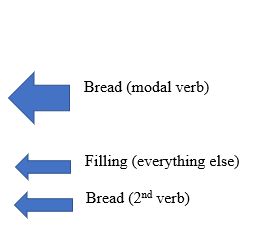
Subject/Verb 1/Everything Else/Verb 2
Whenever German has two verbs in the same sentence, the second one will ALWAYS go at the end of the sentence. You also did this in Chapter 2 when learning about the future tense, which used the helping verb werden + infinitive.
Ich werde nächsten Sommer nach Europa reisen.
Modal verbs function the exact same way. Another good thing is that most of them at least begin with the same letter in English or sound similar.
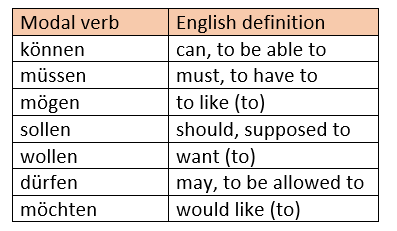
All of the modal verbs are irregular, which means their conjugations must be memorized.
BUT they all have a pattern!

PATTERNS:
- The left side of the conjugation will always be irregular, BUT it will end up looking or sounding more like English.
- The right side of the conjugation will be regular, just like any other regular verb.
- “Ich” and “er/sie/es” will always mirror each other and have the same conjugation with no ending.
- The left side usually has no umlaut and changes the vowel completely.
If you can keep these patterns in mind, you will learn the modal verbs very quickly!
Watch Learn German’s video to see the verb können being retaught.
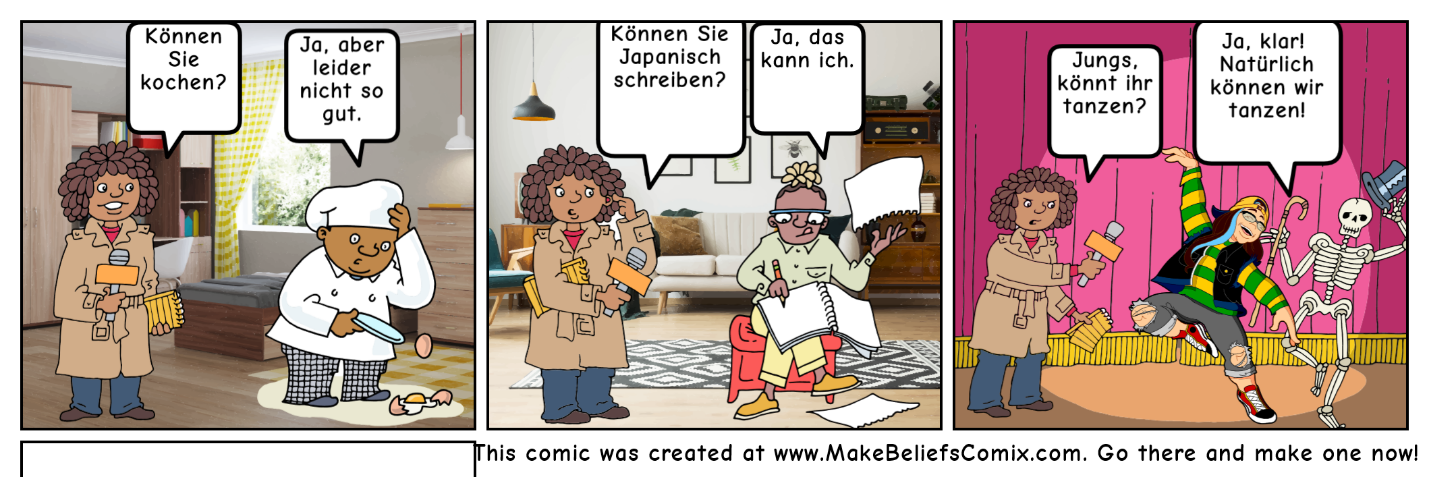
Ex. A: Was kannst du machen? Using the verbs below, make some sentences using the verb können about what you can and cannot do. Then move on to your family members and friends. Don’t forget that the second verb must be at the end of the sentence.
Beispiel: kochen
→Ich kann sehr gut kochen.
→Mein Freund kann nicht kochen.
→Meine Tante und mein Onkel können gut kochen.
- kochen
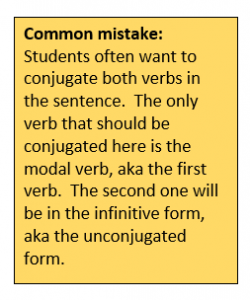
- tanzen
- singen
- malen
- schreiben
- Basketball spielen
- joggen
- Deutsch sprechen
- fahren
- schlafen
Omission of the infinitive:
Sometimes, sentences with können leave out the second verb, especially if it can be easily figured out what the verb would be.
Kannst du Deutsch sprechen?
Kannst du Deutsch?
It looks like the second example would translate to “Can you German?”, but since German is a language, it is pretty obviously that the verb will have something to do with speaking. Therefore, we can leave the verb out. We often do this in English as well, though usually only when the verb is already known.
Can you come to the party?
Yes, I can. (Notice that we have no 2nd verb here!)
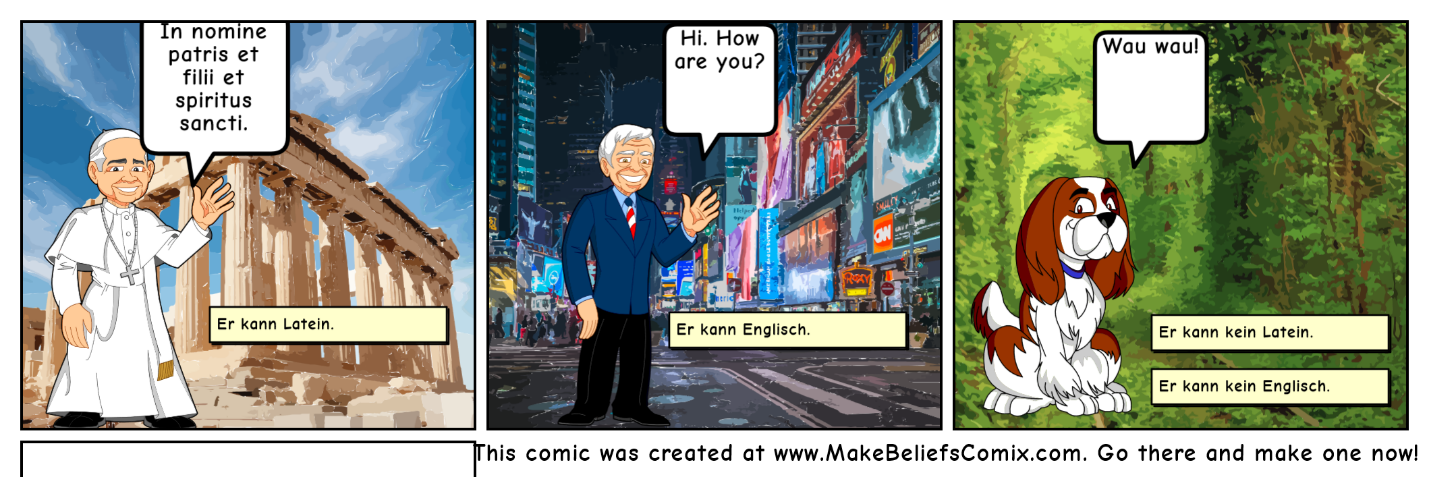
Ex. B: Können Sie Deutsch? Ask your classmates if they can speak the following languages. To practice both sides of the conjugation table, today you will use the Sie-form, treating your partner as a new acquaintance. If you do not speak the language, remember that you will negate it with kein to say that you speak no Italian, etc.
Beispiel: Italienisch
A: Können Sie Italienisch?
B: Ja, ich kann Italienisch.
ODER
B: Nein, ich kann kein Italienisch.
ODER
B: Ja, ich kann ein bisschen Italienisch.
A: Ich kann auch Italienisch.
ODER
A: Ich kann auch kein Italienisch.
- Englisch
- Französisch
- Russisch
- Spanisch
- Japanisch
- Deutsch
- Chinesisch
- Portugiesisch
- Schwedisch
Ex. C: Ein neuer Job! You have just applied for a new job. Make a list of your capabilities to impress the new company so that you have a better chance to get the job.
![]()
- Ich kann sehr gut Englisch (sprechen.)
- Ich kann…
Video. Click to watch me reteaching modal verbs können and müssen.
Use the modal verb müssen to express that you must do something or that you have to do something. Note that the left side drops the umlaut, but it looks a lot like the English word “must.”

COMMON MISTAKE: Students often forget that English sometimes has more than one way to express one idea. For example, the sentence below could be translated two ways.
Ich muss Hausaufgaben machen.
(I must do homework.)
OR
(I have to do homework.)
It’s not always a good idea to translate word for word. Feel free to rephrase the sentence in a similar English meaning before expressing in German.
Just as with können, the final infinitive can be omitted if it is very obvious based on context.
Wir müssen morgen nach Japan [fliegen/reisen/segeln.]
(We must [fly/travel/sail] to Japan tomorrow.)
Watch Learn German’s video to see the verb müssen being retaught with lots of examples.
Watch Anja’s video to see more examples and practice exercises.
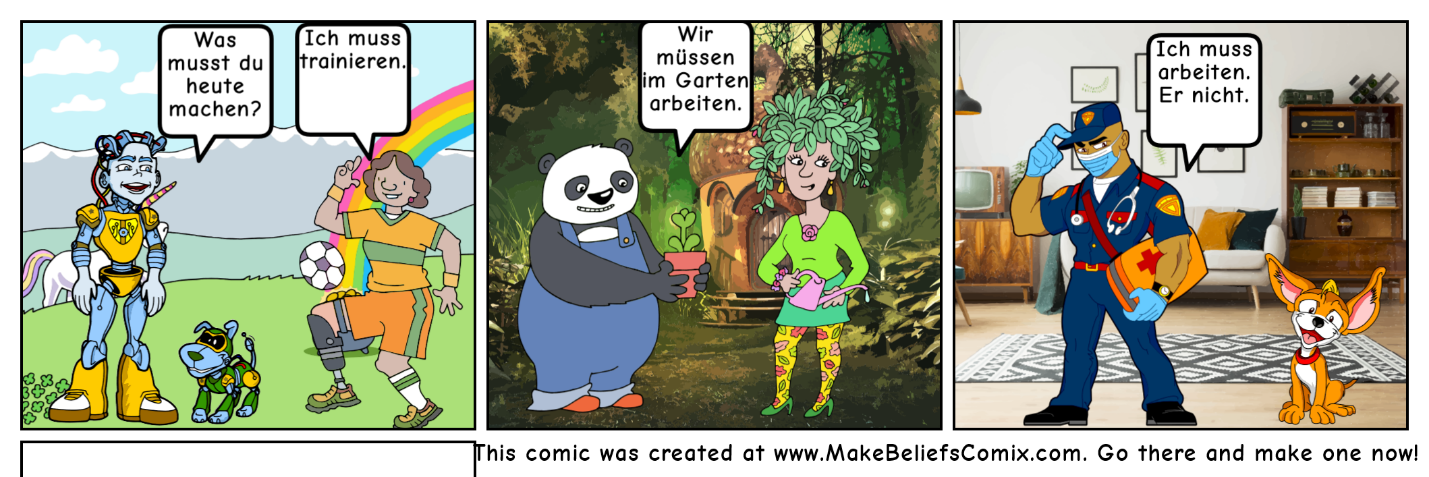
Ex. D: Was müssen Sie heute machen?
Ich muss heute ________. Ich muss morgen _________.
Ex. E: Eine Einladung ablehnen. You have been invited to a party but don’t want to go. Give some generic excuses about what you have to do instead.
Ich kann leider nicht kommen. Ich muss _________.
Ex. F: Wer muss was machen? Take a survey of your classmates to find out who must do what during the next few days. Use the following questions, or come up with some of your own.
- Was müssen Sie heute machen?
- Was müssen Sie morgen machen?
- Was müssen Sie am Wochenende machen?
- Was müssen Sie nächste Woche machen?
- Was müssen Sie im Sommer machen?
Now write a brief paragraph about your classmates’ plans.
Ex. G: Nicos Weg. Episode 25: So wohne ich. Watch episode 25 and do the online activities. You will hear the modal verbs können and müssen. You will also review definite and indefinite articles, the accusative case, and plurals.
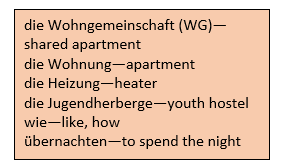
https://learngerman.dw.com/en/so-wohne-ich/l-37425145
To say that you want to do something, use the modal verb wollen.

COMMON MISTAKE: Although this verb looks like the English verb “will,” it means “to want to.” You learned “will,” aka future tense, in Chapter 2.
- Ich will nach Deutschland reisen. (I want to travel to Germany.)
- Ich werde nach Deutschland reisen. (I will travel to Germany.)
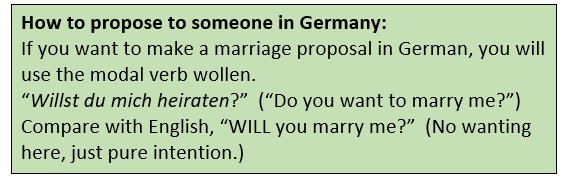

Watch Learn German’s video to see the verb wollen with lots of examples.
Watch Anja’s video to see her reteaching this and to see lots of examples.
Ex. H: Was wollen Sie zum Geburtstag? What do you want for your birthday? What about your friends and family? Write a complete sentence for each person. Don’t forget that any direct objects, i.e. the thing being wanted, must be in the accusative case. Tired of birthdays? Change it up and say what people want for Christmas—zu Weihnachten.
Beispiel: Eltern
→Meine Eltern wollen ein Auto zum Geburtstag.
- ich
- Bruder
- du
- Mutter
- Großeltern
- Nachbarn (neighbors)
- Freund/Freundin
- Hund/Katze
- ihr
Ex. I: Was wollen Sie machen, und was müssen Sie machen? Sprechen Sie mit einem Partner darüber. Unten sind einige Vorschläge, aber Sie können antworten, wie Sie wollen!
A: Ich will _________, aber ich muss _________.
B: Ich auch. Ich muss auch _________.
ODER
B: Ja, ich will auch __________.
- Hausaufgaben machen
- schwimmen gehen
- Videospiele spielen
- Schokolade essen
- gesund essen
- den ganzen Tag schlafen
- eine Reise nach ______ machen
- in Deutschland studieren
- arbeiten
- einen Job finden
- mehr Gemüse essen
EXTRA PRACTICE: (Courtesy of Claudia Kost & Crystal Sawatzky, University of Alberta.)
Click to listen to a song by D’artagnan, Sieben Meilen, (2016) that uses the modal verb wollen: Ich will.
Lyrics: https://genius.com/Dartagnan-7-meilen-lyrics
Click to listen to Das Gleiche, a hit by Glasperlenspiel, (2011) that uses modal verbs können and wollen. You may hear a similar form of können that is könnten and means “could possibly.”
Songtext: https://genius.com/Glasperlenspiel-das-gleiche-lyrics
To say that you should do something or are supposed to do something, use the modal verb sollen. This verb doesn’t change the vowel at all, but it still leaves off the ending of the ich and the er/sie/es form. As always with modal verbs, make sure that the infinitive goes at the end of the sentence.

Du sollst deine Großeltern besuchen.
(You are supposed to/should visit your grandparents.)
Ihr sollt nicht so viele Süßigkeiten essen.
(Y’all/you guys shouldn’t eat so many sweets.)
Watch Learn German’s video to see more examples.

Ex. K: Was sollen diese Leute machen? What should the following people do in order to solve their problems. Answer using the modal verb sollen. Give as many suggestions as possible.
Beispiel: Marina braucht Geld.
→Sie soll arbeiten. Sie soll einen Job finden…usw.
- Stephan hat eine schlechte Note in Mathe.
- Viele Leute sind ungesund und nicht fit.
- Helga kann kein Englisch.
- Monika und Anne haben eine Frage.
- Es ist kalt, und Tina trägt ein T-shirt und eine kurze Hose.
- Ich bin müde.
Ex. L: Die zehn Gebote für Studenten. Was sollen Studenten an Ihrer Uni machen oder nicht machen? Schreiben Sie „die 10 Gebote für Studenten.“
- Man soll (nicht) bei Chick-fil-a essen.
- Man soll…usw.
Deutsche Musik. Listen to Santiano’s song, Ihr sollt nicht trauern, to hear examples of the modal verb sollen as well as ihr-imperative.
Liedertext: https://www.songtexte.com/songtext/santiano/ihr-sollt-nicht-trauern-g3e79dc7.html
You have already learned how to say that you like to do certain things by adding the word gern to any conjugated verb.
Ich spiele gern Videospiele und Golf.
(I like to play video games and golf.)
There is also a verb that means “to like” in German. Here it is below.

In the example above, we could have easily said it with mögen to have the same meaning.
Ich mag Videospiele und Golf spielen.
This is grammatically correct, HOWEVER, the verb mögen is mostly used to say that you like things or people, without an extra verb on the end.
A: Magst du Pizza mit Oliven?
B: Nein, ich mag keine Oliven.
A: Mein Bruder und meine Schwester mögen Pizza mit Thunfisch.
This is similar to other examples of modal verbs in which the final infinitive is omitted. If we had used a final verb in the conversation above, it probably would have been essen, since that’s what usually happens to pizza.
SUMMARY:
- Use gern + verb when you want to say that you like to DO something.
- Use mögen when you want to say that you like SOMETHING or SOMEONE. (Although if you forget and use a verb at the end, you will be understood!)
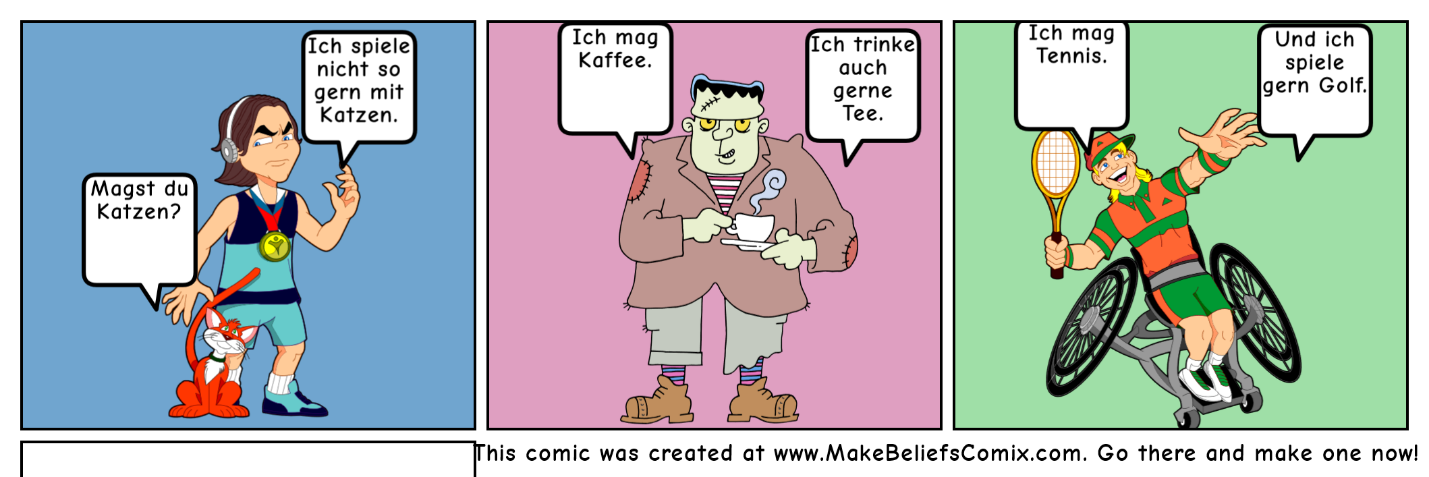
QUICK LISTENING: Listen to Dagmar, AudioLingua, talk about what she likes to eat. You will hear examples of the verb mögen (Ich mag) and also the verb essen + gern, (Ich esse gern…)
EXTRA PRACTICE with modal verbs that omit the final infinitive at Germanzone.org’s website, which will grade your answers.
Watch Anja’s video to see a review of the verb mögen with lots of examples.
Ex. M: Wer mag was? You are planning a party and want to know who likes what. Make sentences with the modal verb mögen, using the cues below.
Beispiel: Werner/Obst (nein)
A: Mag Werner Obst?
B: Nein, er mag kein Obst.
- die Kinder/Brokkoli (nein)
- Brigitte und Sabine/Salat (ja)
- du/Eis (?)
- unsere Professorin/Brot (ja)
- unsere Großeltern/Wassermelone (nein)
- die Katze/Fisch (ja)
- Ronja/Käse (nein)
Ex. N: Gastfamilie. Sie sind Austauschstudent/Austauschstudentin und wohnen bei einer deutschen Familie. Erklären Sie, was sie gerne oder nicht gerne essen. Verwenden Sie das Modalverb „mögen.“
Beispiel: Ich mag Mineralwasser. Ich mag keinen Salat…usw.
To say that something is allowed or not allowed, you will use the modal verb dürfen.

Like a lot of other modal verbs, dürfen changes the vowel in the left side of the conjugation but remains normal during the right side.
COMMON MISTAKE: Students often forget that dürfen can be translated to mean both “may” and “allowed to.”
Wir dürfen hier fahren.
(We’re allowed to drive here.)
(We may drive here.)
The indefinite pronoun man (you, one, they, people) is often seen together with this verb. It will be conjugated the same as er/sie/es.
Darf man hier rauchen?
(May one smoke here?)
(Are people allowed to smoke here?)
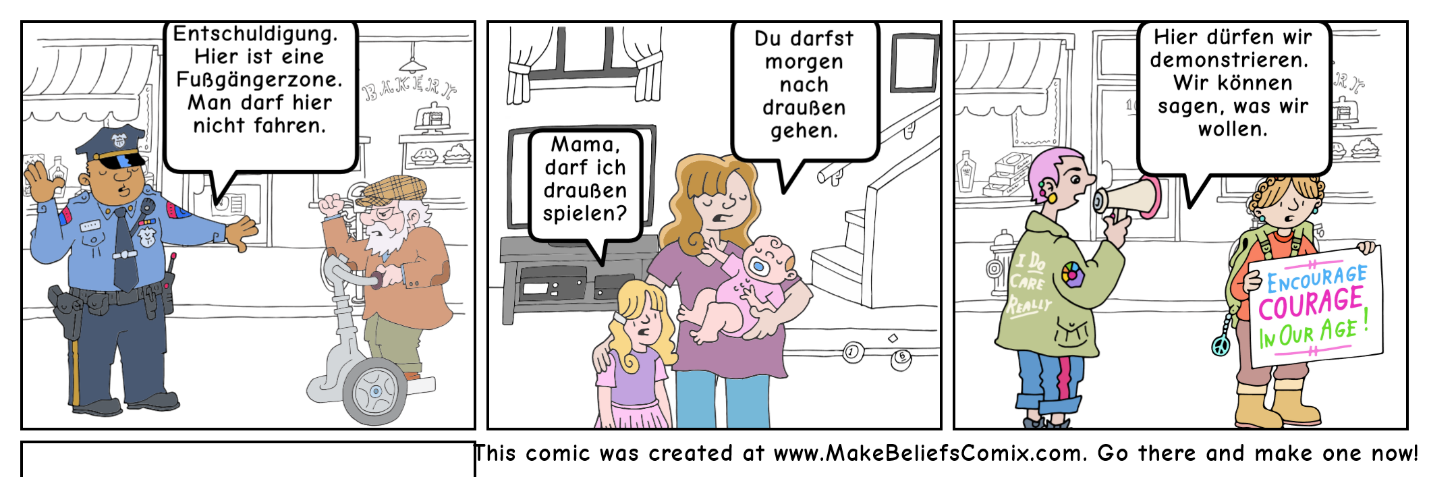
Watch Anja’s video to see her reteaching the verb dürfen.
Watch Easy German’s video to see lots of examples with dürfen.
Ex. O: Was darf man hier (nicht) machen?
Man darf hier __________. Man darf nicht __________.
- schlafen
- rauchen
- Skateboard fahren
- essen
- trinken
- sprechen
- lernen
EXTRA PRACTICE: (Courtesy of Claudia Kost & Crystal Sawatzky, University of Alberta.)
This last modal verb, möchten, is actually not a modal verb, but we often pass it off as one because it acts just like one and it is very practical when ordering food in a restaurant.

NOTE: There is an ending on ich and er/sie/es. This verb is completely regular except for the fact that er/sie/es does not end in –t.
Look at the following exchange.
A: Guten Tag. Was möchten Sie trinken?
B: Ich möchte ein Glas Wasser.
A: Und was möchten Sie essen?
B: Ich möchte das Schnitzel mit Pommes.
Ordering in a restaurant is as easy as filling in the blanks of the sentence, “Ich möchte ____________.”
- QUESTION: Can’t I just use wollen to order my food? As in, “Ich will eine Pizza“?
- ANSWER: Well, yes, there’s nothing grammatically wrong with that, but it’s a lot more polite to say, “I would like a pizza,” than “I want a pizza.”
As for omitting the final verb, it can go either way. If it is implied, feel free to leave it out. If not, put it at the end of the sentence.

Watch Learn German’s video to see the verb möchten being retaught.
Ex. P: Die Zukunft. Was möchten Sie in 10 Jahren machen? In 20 Jahren?
- Was möchten Sie im Sommer machen?
- Was möchten Sie im Herbst machen?
- Was möchten Sie nächstes Jahr machen?
- Was möchten Sie in 5 Jahren machen?
- Was möchten Sie in 10 Jahren machen?
- Was möchten Sie in 20 Jahren machen?
- Wohin möchten Sie im Frühling reisen?
- Wo möchten Sie in 15 Jahren leben?
- Wo möchten Sie in 10 Jahren arbeiten?
Ex. Q: Rollenspiel im Restaurant.
- One student plays the role of the waiter. Another plays the role of the customer.
- Waiter: Ask the customer what he would like to eat and drink. (Hint: möchten = would like)
- Customer: Order your food and drink. (Hint: use “möchten”. Then ask at least 2 questions pertaining to food. (Hint: “Do you have…? Is the Pizza tasty? Does the soup have onions?)
- Waiter: Answer your customer’s questions.
Listen to Lina Maly’s song, Schön genug, 2016, to hear the modal verbs mögen, sollen, müssen, and wollen.
EXTRA PRACTICE: Go to Germanzone.org’s site to do extra practice with the modal verb möchten.
Watch Easy German’s video to see examples on the difference between mögen, wollen, and möchten.
Watch Easy German’s video to see a review of all modal verbs with real life examples.
Ex. S: Liste. Lesen Sie die Liste. Warum soll man Deutsch lernen? Was kann man mit Deutsch machen? Übersetzen Sie ins Englische!
- Man kann besser kommunizieren. 100 Millionen Menschen sprechen Deutsch in Europa.
- Man kann in Deutschland arbeiten. (Und in Österreich, in der Schweiz und in Luxemburg.)
- Man kann besser reisen! Die Deutschen reisen gern. Spanien ist ihr Lieblingsreiseziel.
- Man kann in Deutschland studieren.
- Man kann mehr lernen. Viele Internetseiten und Bücher sind auf Deutsch.
- Man kann andere Kulturen besser kennenlernen. Dadurch versteht man die eigene Kultur besser.
- Man kann in Osteuropa reisen. Viele Osteuropäer verstehen Deutsch.
- Man kann die originale Version der Klassiker lesen—Beethoven, Goethe, Kafka, Kant…usw.
- Es gibt Geld! Man kann kostenlos studieren. DaaD und andere Organisationen haben Geld für Studenten, die in Deutschland studieren möchten.
- Man hat mehr Möglichkeiten, einen guten Job zu finden.
Ex. T: Übersetzen Sie ins Deutsche!
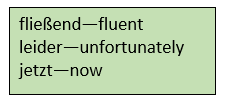
- You’re not allowed to eat here.
- She can speak fluent German.
- I’d like to travel around the world.
- What would you like to drink?
- Unfortunately, I can’t come.
- The children should do their homework now.
- His sister has to work on Monday.
- May I ask where you live?
- Do you guys like pizza without cheese?
EXTRA PRACTICE: Go to Germanzone.org’s site to do lots of extra practice with modal verbs. As always, the site will grade your answers.
- https://www.germanzone.org/modal-verbs-present-tense-1/
- https://www.germanzone.org/modal-verbs-present-tense-2/
- https://www.germanzone.org/modal-verbs-present-tense-3-verkehrsschilder/
- https://www.germanzone.org/modal-verbs-present-tense-5/
Ex. U: Artikel. Lesen Sie den Artikel über Tourismus in Deutschland und beantworten Sie die Fragen in ganzen Sätzen.
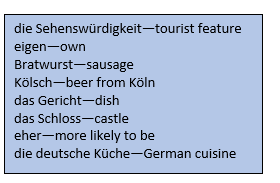
Jedes Jahr reisen viele Touristen nach Deutschland. Es gibt viele Sehenswürdigkeiten—Flüsse, Berge, Seen und natürlich viele alte Schlösser.
Man kann in Deutschland sehr billig reisen. Es gibt überall Züge und Busse, und man kann auch zu Fuß gehen. Deutsche Städte haben viele Fußgängerzonen. Hier dürfen keine Autos fahren. Man kann ohne Probleme durch die Stadt spazieren.
Es gibt auch viele leckere Restaurants und Cafes, wo man deutsche Spezialitäten probieren kann. Jede deutsche Stadt hat seine eigene Spezialität. In Aachen, zum Beispiel, findet man Printen. In Nürnberg ist Wurst sehr beliebt—die nürnberger Rostbratwurst. Sogar Bier kann eine Spezialität sein; in Köln trinkt man Kölsch. Für Vegetarier gibt es auch viel zu probieren; ungefähr acht Millionen Deutsche essen kein Fleisch. Viele Restaurants haben vegetarische Gerichte.
Man soll die vielen alten Schlösser nicht vergessen! Einige, wie Neuschwanstein in Bayern, sind nicht so alt. Andere stammen aus dem Mittelalter. Oft sieht man in Deutschland moderne Häuser und alte Gebäude nebeneinander. In Deutschland sieht man neue Technologie und alte Kultur jeden Tag.
- Beschreiben Sie die Landschaft in Deutschland.
- Wie kann man in Deutschland reisen?
- Was ist eine Fußgängerzone? Was kann man dort finden? Was kann man nicht finden?
- Meinen Sie, die deutsche Küche ist auch eine „Sehenswürdigkeit“? Warum oder warum nicht?
- Wie viele Vegetarier gibt es in Deutschland?
- Was und wo ist Neuschwanstein?
- Beschreiben Sie eine typische deutsche Stadt. Ist sie eher modern oder altmodisch? Warum?
- Was möchten Sie in Deutschland sehen?
Video. Watch Easy German’s video about cats. You will hear several modal verbs that you have learned in this chapter.

